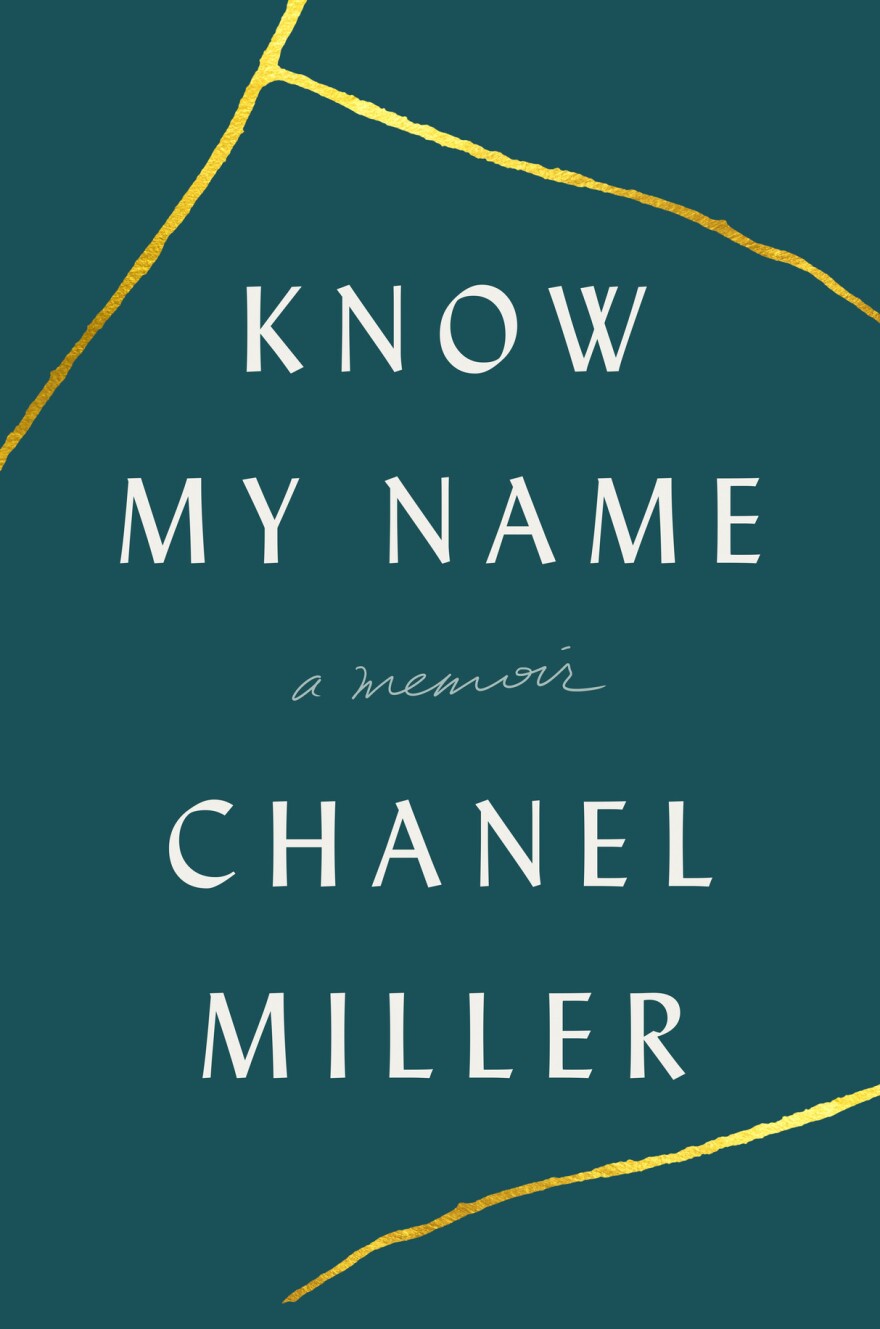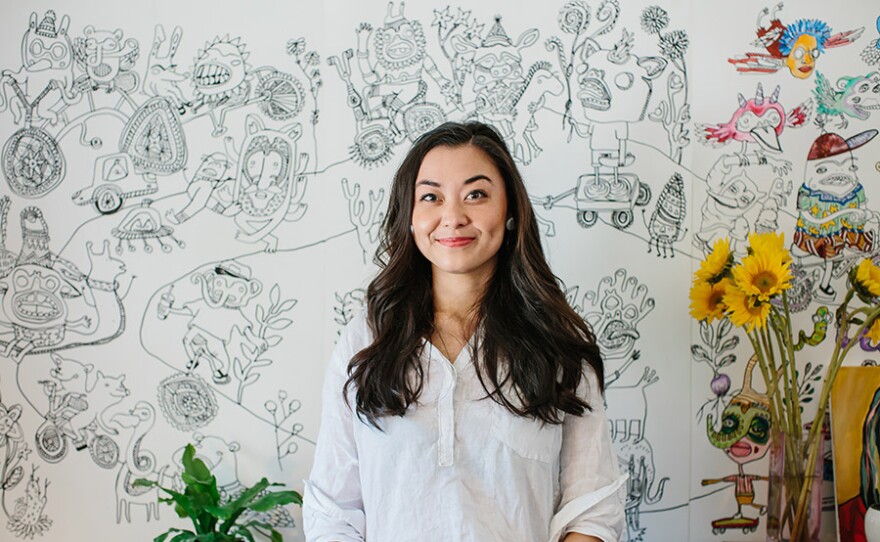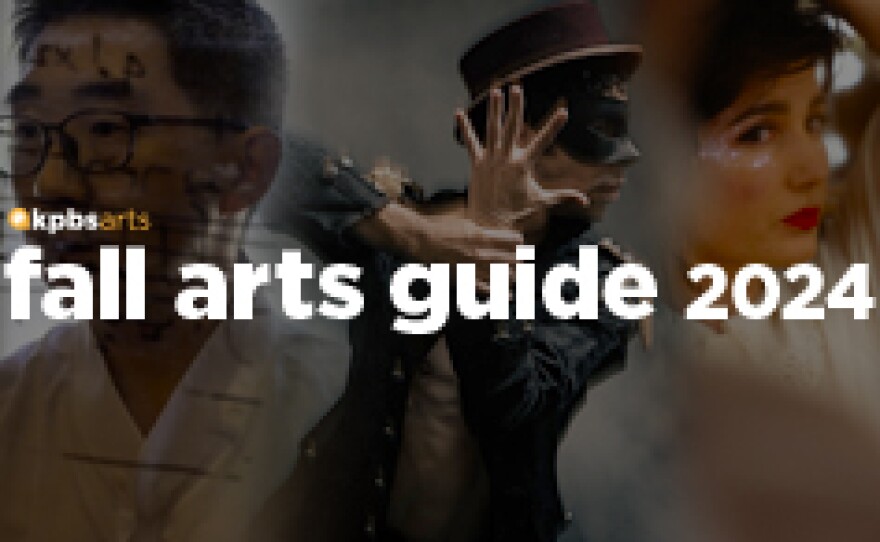Last month, KPBS announced the official selections for One Book, One San Diego.
Through partnerships between KPBS and over 80 public libraries, the program brings San Diego together through reading.
This year’s adult selection is Chanel Miller’s best-selling 2019 memoir, “Know My Name.”
Join the discussion! One Book, One San Diego Author Event with Chanel Miller
7 p.m.-8:30 p.m. Wednesday, Sept. 18, 2024
University of San Diego
5998 Alaca Park Way San Diego, CA 92110
In the book, Miller reveals herself as ‘Emily Doe’ in the People v. Turner case of 2015. She writes about her experience during the trial and coping through the trauma of sexual assault. Through captivating metaphors and a touch of humor, Miller takes readers through the long process to reclaim both her narrative and identity.
Content warning: The book and following interview explore mature themes, including sexual assault, trauma and other challenging subject matter. Reader discretion is advised. Resources can be found here.
This interview has been edited for brevity and clarity.
First of all, congratulations on being selected for One Book, One San Diego. How did you find out you were selected?
Miller: Through an email in my flurry of emails (laughs). It’s still always a surprise at how well the book is received and how people have embraced the story, even, you know, five years past publication. I'm so happy to come in person and meet people.
It's been nearly five years since ‘Know My Name’ came out. What has it been like to reflect on these past five years, and the incredible reception the book has gotten over that period of time?
Miller: It's been such a contrast to my life after the assault because after the assault, the experience was so isolating and I was so hungry to find somebody to talk to. I never knew who was safe to trust. I would pay attention to how family and friends would react to news of similar stories, to books they read. I was looking for signals, if it would be safe to tell certain people.
"By selecting this book, you're signaling to so many survivors that this is something you actively want to engage in."Author Chanel Miller
Something that I think is so incredible about (One Book, One San Diego) is that by selecting this book, you're signaling to so many survivors that this is something you actively want to engage in. I promise you, there are people out there right now with their little antennas up, trying to figure out where they can go and how they can disclose their stories. I think when we all gather and educate ourselves, we are showing the survivors in hiding that we are equipping ourselves with the tools to help them and that we will listen, non-judgmentally, when they come to us. You know, in this conversation, you've been very warm, and it just shows survivors there is a way forward because people are readying themselves for our stories.
Well, tell me about yours. Take me back to when you first decided to write "Know My Name." For three years before the book's release, you wrote anonymously. When did you decide you wanted to reclaim your story and put those experiences to paper?
Miller: I majored in literature and I loved writing. While I was writing, it wasn't just relaying the facts, because anyone could find out about the case on Wikipedia. I was thinking, ‘what is the most artful way to say these things?’ And it actually made a lot of the most painful feelings bearable because I looked at the painful feelings like puzzles. Like, you are a challenge, how do I translate this amorphous feeling into language?
I wrangled with all of these really spiky feelings inside myself, and got them down to the page. By the end of that, I felt so proud of what I had done. I wanted to be able to share it. I wanted to be able to meet readers, like connect on a human level. I was hiding so much because I didn't want to be publicly annihilated, shamed, criticized. But luckily, you know, I had enough faith. Again, I was looking to see if there would be enough support out there for me so that even if I faced a lot of backlash, there would be people who would show up for me, join me in rooms, and be open to talking about these things.
I'm so glad I followed that and entrusted that. Five years after coming forward, people are still inviting me to spaces and wanting to engage in conversation. That’s wonderful.
Yeah. I mean, before getting such a warm reception, I imagine it was a challenging process to center yourself in this. How did it feel to work through that?
"The way we blame survivors, we just kind of copy and paste the same critiques each time one of these stories happens."Author Chanel Miller
Miller: Oh, it was so painful. I absorbed all the negative comments when I was younger. I read all of them online, I took them in like a sponge. You know, now that I've read about so many stories, heard about them, met so many survivors — I realize how common the criticisms are.
The way we blame survivors, we just kind of copy and paste the same critiques each time one of these stories happens. And I thought, gosh, you could really make like a bingo card of all the things the trolls will say and fill it out every time a survivor comes forward. So I thought, oh, it's not about the individual. It's not about me, it's not about my personal flaws or character deficiencies, inadequacies. It's about the way we push survivors away because we don't want to think we're as vulnerable. We want to think, ‘Oh, I'm smarter than that. So it would never happen to me.’ We want to keep survivors at a distance because then we'll feel more safe.
"We want to keep survivors at a distance because then we'll feel more safe."Author Chanel Miller
There are so many people who don't want to realize that survivors are just like us. Because that's a terrifying reality to face. So, I took a lot of the self criticism away and realized that the people who pushed me away or who said 'there's something wrong with you' wanted to believe that to create distance, so that they wouldn't have to be threatened by the fact that the same thing might happen to them.
The following quote from your book really speaks to what you're saying. You write, "I didn't know that if a woman was drunk when the violence occurred, she wouldn't be taken seriously. I didn't know that if he was drunk when the violence occurred, people would offer him sympathy." What was your experience like with the media during the case?
Miller: At the beginning, I turned inward so much, I kept thinking, ‘What's wrong with me?’ I was being cross examined. I was being scrutinized. So I would look at myself too and think, ‘What are the things that I have to fix in order to make this right? Why couldn't I have done better?’ All the weight was coming on to me. Then, I realized the defense was using this tactic because if I was so hard on myself that I shut down and shut up, it would make it so much easier for my oppressor's side.
But as soon as I learned to step on my own side, that's when they started having something to fear. Because as soon as I realized I shouldn't be tolerating any kind of verbal abuse and blame, my power started to return.
I want to talk more about the craft of the way you've told this story. You're a very strategic writer with metaphors really carefully embedded in your work. I mean, even in this conversation, I've heard you use a couple of metaphors. What kind of power does a good metaphor hold?
I think what's incredible about metaphor is you're giving somebody a different entry point into the story. To talk about the thing directly can sometimes be too much for people, but if you use a metaphor, I'm giving you a different visual that you can enter into, but still access the same feeling in the end.
Another technique along those lines is humor. How does humor complement some of the darker themes in your book and really get at the full, honest range of emotions related to trauma?
Miller: I think humor lives side by side with darkness. I was always so nervous to be caught laughing when I was around the courthouse because I was worried my laughter would be used to dismiss the gravity of what was happening. Or to say, 'Look, she isn't really suffering.' Really, laughter was the only thing that could get me through those times — to make light of something to point out how absurd something was.
I needed levity and humor, as a means of survival. It did not negate my suffering.
This book is a memoir. Is there something about that genre that really draws you in or resonates with you?
"I needed levity and humor, as a means of survival. It did not negate my suffering."Author Chanel Miller
Miller: That’s a great question. I love reading memoirs because you just realize how messy we all are inside. We present like very organized, articulate versions of ourselves. Memoirs are so comforting, because I realize we're all really grappling with something or sitting on something we don't know how to share.
I would read memoirs and I would push myself to share as much as I could. I've never been made to feel strange about anything I shared in the book. I'm so proud of my ability to be messy on display and not present myself as this pristine, clean, ‘good’ survivor.
I want to show that I am a complicated person with a history, and that still doesn't mean that people can do whatever they want to me. I deserve to be treated with respect and kindness, because I'm a human, plain and simple, you know?

Absolutely. And you know, we don't always pay a lot of attention to a book's cover, but "Know My Name" has this beautiful artwork. I just learned it's inspired by Japanese art, actually. What does it symbolize?
Miller: Yeah, Kintsugi. It’s this Japanese method of, when ceramics break, you can put all the pieces together and mend it with these golden seams. The cracks are gold and it's a way of highlighting the imperfections and brokenness rather than trying to hide those things or just throw the pieces away because the vessel isn't good. I love that it's about repair and return and embracing the new form that you're taking.
You’re a visual artist yourself, and your work has been shown widely. How important has art been in both your healing process and your growth as a person?
Miller: Art allows me to be really playful and whimsical. Even when I was writing, you have to be so meticulous, laying down word after word. In art, I can be more expressive and strange.
I remember, when I was testifying, I had to take this marker and there was this huge sheet of paper behind me. I was asked to draw this timeline in front of the jury, and I thought, ‘Man, I wish the jury would yell out, you know, like animals or like scenarios that I could draw instead.’ I can draw like a zebra riding a bicycle, straight out of my head. I just felt like I had all of this talent and color, and other things to express and say. Now I'm so happy that I can do that.
Whether it's a paintbrush or a pencil, then, how would you encourage others to express themselves creatively, especially as a means to tell their personal stories?
Miller: Oh, I would just say, get it out. Get it out in any form that you can. These stories are so heavy, especially things like assault. They can become rotten when they're sitting too long inside us. These stories are not meant to live caged up. They're not meant to be handled on your own, they're meant to be expressed, and they're meant to be held as a community.
"These stories are not meant to live caged up. They're not meant to be handled on your own. They're meant to be expressed, they're meant to be held as a community."Author Chanel Miller
The only way to bear these things is by sharing them. We are here to do that. You all are here to help me do that, as I continue my journey. I hope that in any medium, you can just get it out of yourself. I don't want you carrying around a really painful, thorny thing for your whole life.
As for your more recent work, you actually published a middle grade novel earlier this year. It's called "Magnolia Woo Unfolds It All." What's that about, and what made you want to write this fun, detective-type story?
Miller: Okay! So, Magnolia Wu is a 10-year-old Chinese American girl living in New York City. Her family owns a laundromat. She takes all the missing socks and becomes a sock detective and goes around the city, returning socks. I love the sock, because it's like this subtle hint at somebody's personality. She unlocks these stories about people, things she never could have predicted about them.
Magnolia moves around the city with her friend Iris. They're both Asian American. I was living in New York City during the pandemic, during all the anti-Asian violence and hate. I was advised to stay inside and not walk alone. And I thought, 'I'm always being told to stay home after the assault too. Stay home, stay safe. Don't be visible.' And I thought, 'no one's ever telling me, get out there,, take on the world, and enjoy it.' I thought, if I can't do that in my real life, I can create these young girls who can move throughout New York City freely and bravely and can treat it like a playground.
"I thought, if I can't do that in my real life, I can create these young girls who can move throughout New York City freely and bravely and can treat it like a playground."Author Chanel Miller
I can hear you smiling as you talk about it. What have you gained from writing that story?
I now get to tour elementary schools. Being with kids has been so freeing because their questions are so absurd and unpredictable. I was scared of unpredictability, even doing interviews for my memoir. I wanted to establish control. I want to contain the conversation and guide it. I was really scared of things I hadn't prepared for. But this type of unpredictability with kids is so beautiful and random.
Before, not knowing what the next day would bring was like a terrifying idea. Now, not knowing what the next day will bring is exciting for me.
That's excellent. And back to "Know My Name," what do you hope readers take away from the book this year as part of One Book, One San Diego?
I remember that all those years I was anonymous, I was listening for signs of support. I would sometimes hear things on the radio and pull my car over, if someone was talking about sexual assault. I was looking for a way forward.
I hope survivors know that life is long. There are going to be intensely painful, seemingly unbearable periods. But I ask you to be patient, to ask for help, even if it's just one person. Know that so many have been where you are now, and we're trying our best to create a pathway forward for you. There's still a lot of joy to be uncovered, which is what I'm really finding now.










